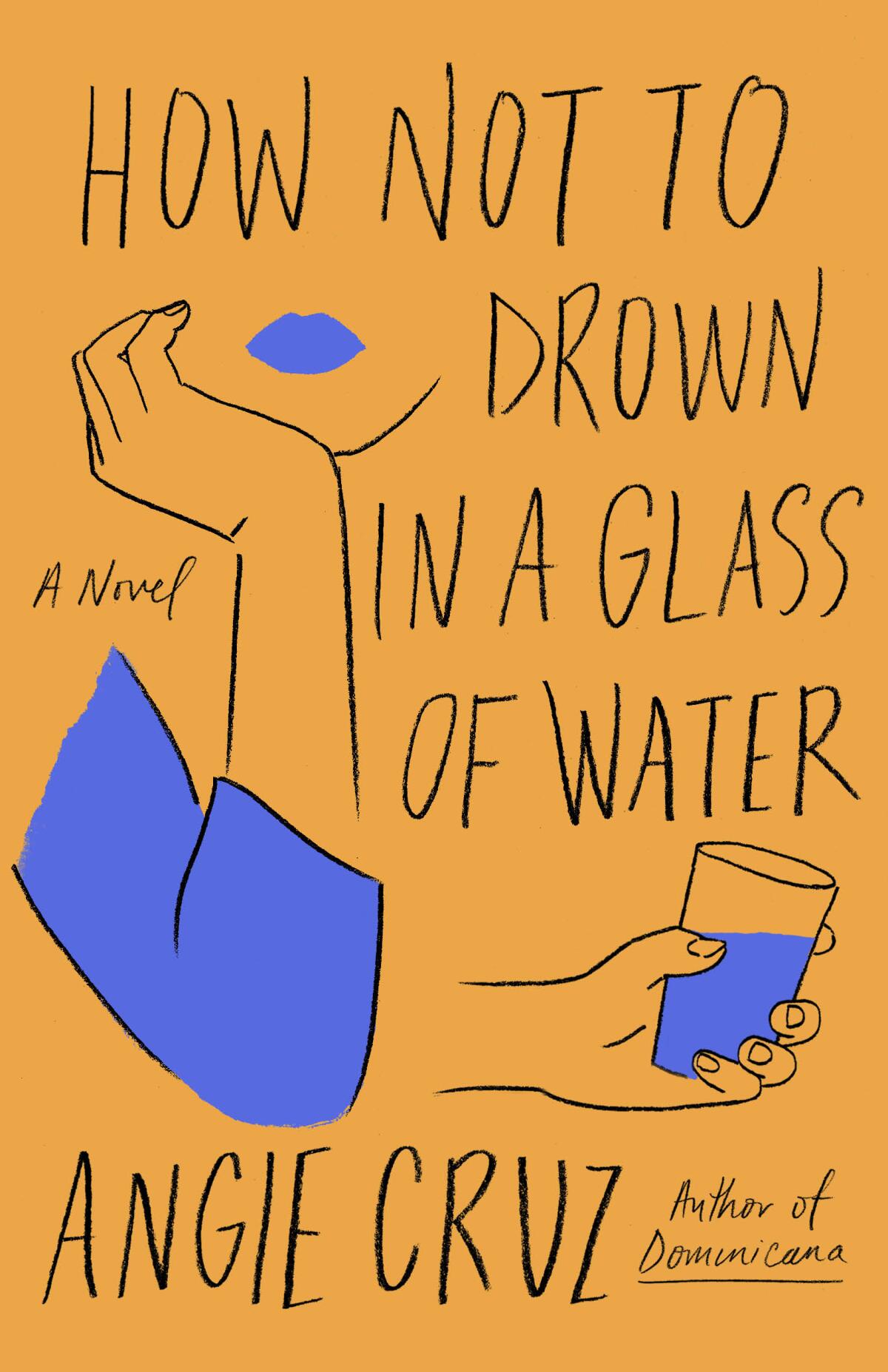In Angie Cruz’s portrait of a neighborhood busybody, the soul of a Latino community

- Share via
On the Shelf
How Not to Drown in a Glass of Water
By Angie Cruz
Flatiron: 208 pages, $28
If you buy books linked on our site, The Times may earn a commission from Bookshop.org, whose fees support independent bookstores.
I don’t know the average number of therapy sessions a new client would need to tell her complete life story, but Cara Romero will do it in 12. Make that 11. And it’s not therapy — or it’s not supposed to be.
It’s 2009 and Ms. Romero, a 56-year-old Dominican immigrant in Washington Heights, knows an opportunity when she sees one. The Senior Workforce Program in New York City pays extended unemployment benefits to anyone willing to attend 12 sessions of job training — four whole months of relief!
“Please write that down: Cara Romero wants to work,” she explains to the counselor. But first, she asks, is it OK if I grab one of your free bottles of water? Yes? Yes. “Does it taste strange to you?” Before long she’s going on about her old work friend, Lulu, who is two years younger, though you wouldn’t know it. “Her skin is like a penny,” Ms. Romero says. “Not a brilliant penny, more like an old penny.”
“How Not to Drown in a Glass of Water,” the latest novel by “Dominica” author Angie Cruz, will have you laughing line after line, even when you wonder if you should be. (The answer is always yes! ) By the time her sessions are up, though, you’ll feel like many of those who know Ms. Romero; that her incessant chatter has become as life-sustaining as the substance she can’t stop drinking.
Water may be to Ms. Romero what spinach is to Popeye; it keeps her strong for herself and others when she needs to be, even when she goes into a session a few days after surgery. Her resilience calls to mind the way some refer to women of color as “superhuman,” skipping over more normative and helpful descriptions like “qualified” and “capable.”
Deón, an L.A. defense attorney, psychology student and author of the novel “The Perishing,” weighs in on the politicized drive to erase the past.
Not that Ms. Romero would describe herself as either capable or qualified; she’s merely doing what she must to get by. She might be described as an over-sharer. “I came to this country because my husband wanted to kill me,” she says by way of introduction. “Don’t look so shocked. You’re the one who asked me to say something about myself.”
When her husband chopped off her lover’s leg with a machete, she began her journey to America. In tow was her young son, Fernando, who she is proud to say has never gotten anyone pregnant or been to prison, though she regrets to say they aren’t getting along these days.

It’s not the only tenuous or broken relationship in her life. From time to time, Ms. Romero finds herself estranged from those who know her best — her son and, for a while, her sister Angela, whom she waits up for at the elevator to her building only to be brushed off with a “not today, Cara.”
But as she presents herself, she is infallible, reliable to a fault.
“What are your weaknesses?” her job counselor asks her.
“Pfft! This question is a trick,” Ms. Romero says. “Write that down: Cara Romero is strong.”
She is, in fact, fragile — at least financially (though she parries with: “It’s OK right now because I get El Obama checks”). She will soon have to vacate the building she has lived in for 25 years so her landlord can renovate the space for renters who won’t look or act like the Cara Romeros of the world.
This is the novel’s buried tragedy — the tragedy of gentrification personified in a character of almost mythic flaws and strengths. Because to many of her neighbors, she is in fact indispensable.
The latest from Ling Ma, Yiyun Li, Russell Banks and Namwali Serpell as well as exciting newcomers round out our critics’ most anticipated fall books.
When a woman in her building suddenly dies and Ms. Romero discovers her body, she cleans the woman’s apartment before calling the ambulance, giving her a last dignity — something many wouldn’t think to do. She is also the unofficial daycare worker in the building. (She’ll have a little sip of the wine while doing the caring, but who wouldn’t? And she’s not licensed, but who is?)
Everyone has problems and Ms. Romero is there for them. Lulu, of the old-penny face, needs help interpreting her dreams so she can choose the numbers she plays on Sundays. Another neighbor, who recently lost her partner, can’t physically leave her apartment to walk her only surviving companion, a dog named Fidel.
Ms. Romero is available.
Cruz writes in English with braids of Spanish that won’t leave non-Spanish speakers lost. In any event, the author’s language reaches out beyond the intellect, doling out the smells of Ms. Romero’s cooking, the felt silences in her one-sided conversation, the hum of the urban network she sustains as a matter of being. Cara Romero becomes your own memory.
She feels like a wild yet safe place — like a neighborhood both anarchic and secure. What Cruz has written is an ode to the aging auntie on the stoop, with no visible qualifications or obligations — except the essential task of holding the neighborhood together, in part by protecting its loneliest, its most infirm or marginalized.
Cruz’s quick-reading character study is only simple on the surface; Ms. Romero is a complicated woman. Shouldering (and shrugging off) middle age, frayed community, fractious friends and family and the hard squeeze of economics, she has a keen social prowess that often misses its target. But Cruz never misses. Her new novel aims for the heart, and fires.
In “The Women Could Fly,” Megan Giddings’ second novel, women are monitored for signs of witchcraft and only the bravest question the status quo.
Deón is a two-time NAACP Image Award nominee for Outstanding Literature, Hurston/Wright Foundation Legacy Award nominee, PEN America fellow, author and criminal lawyer.
More to Read
Sign up for our Book Club newsletter
Get the latest news, events and more from the Los Angeles Times Book Club, and help us get L.A. reading and talking.
You may occasionally receive promotional content from the Los Angeles Times.












